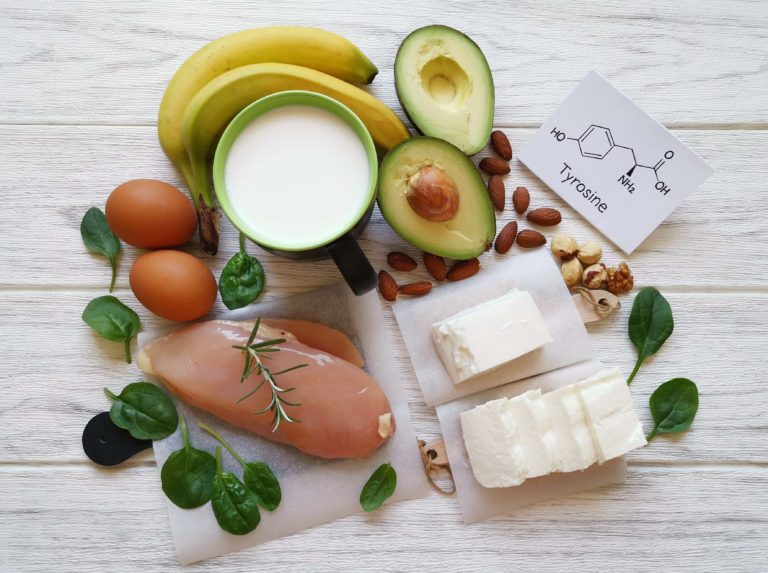Do You Need More Thyroid Support?
When sluggish thyroid (hypothyroidism or Hashimoto’s thyroiditis) develops, many people think the only solution is to take synthetic thyroid replacement (levothyroxine). And while that may be helpful, there are nutritional changes that can be very helpful for thyroid support. You can learn the basics of thyroid function here.
The thyroid is responsible for using iodine and protein from our diet to create thyroid hormones (especially T4). Our tissues then convert that T4 into the active form of the powerful metabolic hormone T3. Nutritional support is critical, as every cell in the body relies on thyroid hormone for the regulation of its metabolism. After all, if there’s not a lot of gas in the car, it won’t go far!
What is Hypothyroidism?
Hypothyroidism (or thyroid under-function) is a common, under-diagnosed, under-treated disease affecting many millions of people, mostly women. Common symptoms include ongoing fatigue, inability to tolerate cold, easy weight gain, elevated LDL cholesterol, painful PMS, depression, hair loss (on the head), brain fog, poor GI motility (often including constipation), and muscle weakness or low stamina.
Low thyroid function can be caused by a wide array of things including poor diet, low iodine, pesticides, ongoing chlorine exposure, fluoride intake, toxins, radiation, or over-consumption of inflammatory, dietary fats. Hypothyroidism is also often an autoimmune dynamic (sometimes called Hashimoto’s disease or thyroiditis), where the action of the immune system itself is actually negatively affecting our own thyroid function. You can read more about that here.
Nutritional Powerhouses for Thyroid Support
A fully balanced whole foods diet is key for the thyroid, including vegetables, sea vegetables, nuts/seeds, fruits, and (if it feels good in your body) animal protein and fats. Legumes and gluten-free whole grains may also be nourishing if you digest them well and if they don’t cause you to feel even more sluggish (they are heavy carbohydrate foods and, as above, may promote inflammation).
Specific foods can contribute to thyroid health when added in moderation to your diet.
- Sea vegetables can benefit the thyroid because they contain high concentrations of iodine, as well as supportive iron, phosphorous, potassium, sodium, zinc, magnesium, calcium, copper, chromium, vitamin A, and B vitamins.
- Seafood, especially those with a pink color, are also good sources of iodine and healthy fats. In particular, try shrimp, lobster, salmon, halibut, sardines, and crab meat. Choose wild-caught varieties.
- Nuts and seeds. The thyroid absorbs iodine and combines it with tyrosine (an amino acid) to produce thyroid hormones. Nuts and seeds provide healthy fats and minerals and are also an excellent source of plant-based protein. We also need good “eating hygiene” (ample chewing is key!) and protein digestion (including strong amounts of stomach acid) to bring key amino acids into the body to support hormone and neurotransmitter synthesis.
- Brazil nuts. Selenium is necessary for T4 to T3 conversion. The soil in some areas of the world (e.g. New England in the US) is particularly deficient in this mineral. Brazil nuts are one of nature’s most potent sources of selenium, so you only need a few per day (a very high intake can cause side effects and impair absorption of other minerals). Other sources (though much less potent) include turkey, smoked herring, scallops, chicken, eggs, and walnuts. If you try a selenium supplement, don’t exceed 200 mg/day, and be sure to take it on a full stomach. Higher amounts can be toxic.
- Coconut oil. Unlike highly refined, cheap vegetable oils that can promote inflammation in the body, coconut oil does not block thyroid hormone secretion. A medium-chain saturated fat, coconut oil is nature’s richest source of MCTs (medium-chain fatty acids) which increase metabolic rate and can help increase energy for those who have insulin resistance or other forms of poor metabolism.
- Protein and iron. Be sure to get adequate protein from a variety of forms, including fish, chicken, eggs, seafood, cheese, or plain yogurt. If you do well with hardier meats, include beef and organ meats such as liver as well. Choose organic and grass-fed varieties. You need iron to convert T4 hormone to T3; many people with sluggish thyroid also have low iron (the best blood test for this is ferritin) which can escalate symptoms over time.
- You also need sufficient Vitamin A to allow thyroid hormone synthesis. If you are diabetic or have low thyroid function, Vitamin A often must come from animal protein sources to be well absorbed (these individuals often cannot synthesize it effectively from carotenes in vegetables). Natural Vitamin A also comes from cod liver oil and egg yolks.
- Zinc. This is a very common American deficiency! Meats and seafood are wonderful sources of zinc; oysters are the most potent food source overall. Pumpkin seeds and chickpeas are some of the best vegetarian sources of zinc. Individuals with vegan diets often struggle with an imbalance of zinc and copper with insufficient zinc.
There are also foods that contribute to thyroid dysfunction.
- Processed, packaged convenience foods. Because these are typically depleted of minerals, regular consumption reduces overall body nutrition (empty calories) and can inhibit thyroid function.
- Unfermented, processed soy products. Americans overconsume refined and highly processed soy products such as soy milk and “fake meat” products marketed to vegetarians. Fermented soybean products, a healthy staple in many Asian cultures, including tempeh, miso, natto, shoyu, and tamari (natural soy sauce) can be consumed in small quantities. If you do choose to consume soy products more often, it is particularly key to ensure you have adequate selenium and iodine intake.
- Too many raw cruciferous vegetables. There is a myth out there that people with thyroid problems shouldn’t eat ANY raw cruciferous veggies. This is not true. These are very healthy foods and should definitely be part of your daily diet. This family of vegetables includes goitrogens which are deactivated with heat (not so with those in processed soy). Foods from these families (e.g. Brassicaceae) containing goitrogenic compounds include broccoli, kale, collard greens, mustard greens, cauliflower, Brussels sprouts, radishes, turnips, bokchoy, arugula, daikon, and rutabaga. Small servings of these veggies raw are fine, so don’t be afraid of them! If you have low thyroid function and tend to indulge heavily in these vegetables, good for you; just choose most of them in a cooked form.
- Fluoride, chlorine, and bromine -all block iodine receptors in the thyroid gland. These are found in toothpaste and tap water (fluoride), municipal water supplies, pesticides, and numerous household cleaners (chlorine), and many pesticides and almost all commercial baked goods and flours (and flour-containing foods). Many alternative types of toothpaste are available. Many water treatment systems filter out chlorine and fluoride; when buying water outside the home, choose distilled or spring water. Look for unbleached and unbromated flours.
- Caffeine and stress. A life fueled by caffeine to make up for lack of rest and sleep (and to enable you to be stress-riddled most of the time) often leads to exhaustion of the adrenal gland. Stress hormones secreted by the adrenal gland can block thyroid hormone function and lower your metabolism as a protective mechanism.
If you’ve discovered a potential thyroid imbalance, supporting your overall well-being through a healthy diet is an important step.
Dr. Anna Garrett is a menopause expert and Doctor of Pharmacy. She helps women who are struggling with symptoms of perimenopause and menopause find natural hormone balancing solutions so they can rock their mojo through midlife and beyond. Dr. Anna is the author of Perimenopause: The Savvy Sister’s Guide to Hormone Harmony. Order your copy at www.perimenopausebook.com.
Dr. Anna is available for 1-1 consultation. Find out more at www.drannagarrett.com/lets-talk




